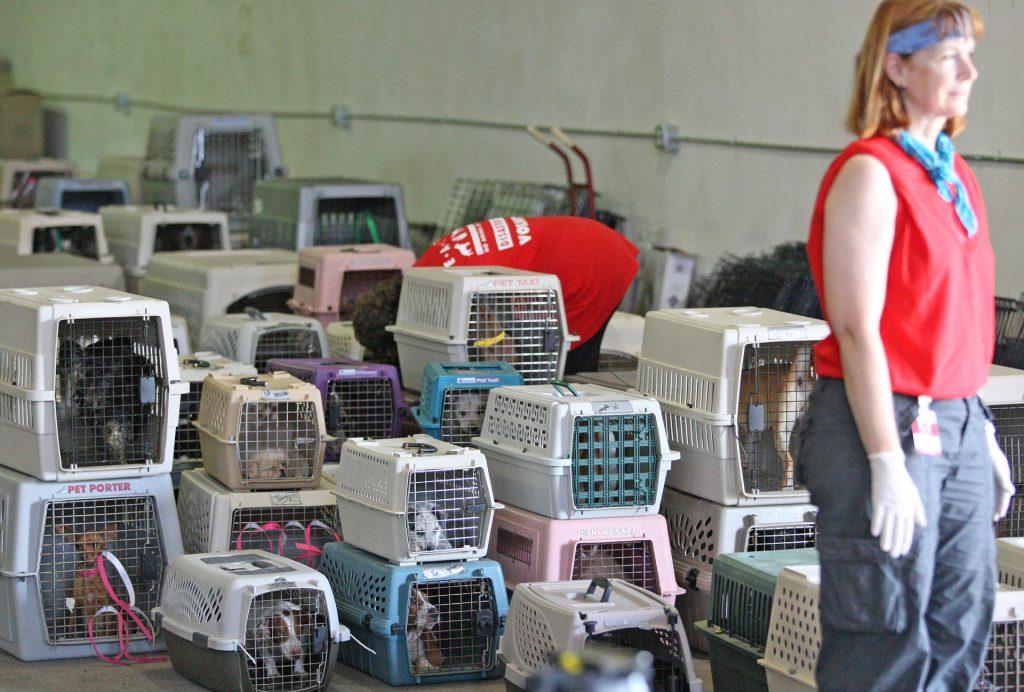Pet stores bring together people who are ready to love and care for animals who need homes. Unfortunately, this is no longer reality, because commercial breeders value money more than the lives of their dogs.
Petland is a retail pet-store chain that has locations nationwide, including in Iowa City. “Commercial breeders are not puppy mills” reads the page titled Breeders on its website. The company prides itself in saying its puppies “…come from [U.S. Department of Agriculture]-licensed breeders and distributors with no direct violations on their latest inspection report …”
But in 2009, the U.S. Humane Society conducted an investigation finding that 95 percent of the chain’s stores did, in fact, support puppy mills. Iowa City’s Petland was no different.
Iowa City’s Petland, in particular, has been recorded by the Humane Society buying puppies from Top Notch Puppies in West Point, Iowa. Although Top Notch is cited as a licensed commercial breeder by the USDA, it still produces and sells puppies that are sick because of substandard living conditions. For example, a particular Vizsla puppy from “commercial breeder” Top Notch had to be put down at 15 weeks old because of pneumonia, giardia, and distemper. It was not purchased from the Iowa City Petland.
Pneumonia is a commonly known illness, while giardia and distemper aren’t as familiar to most people. Giardia is an intestinal infection contracted by drinking feces-contaminated water, meaning the dogs at Top Notch aren’t given clean drinking water. It is most common for puppies purchased from puppy mills to carry the giardia parasite, says pet nutritionist and animal wellness veterinarian Karen Becker. Dogs can contract distemper when they are not properly immunized and then come into contact with an infected animal.
Since the investigation, there has still been no higher sanctions put on commercial breeders to improve the health of their dogs. The only amendment to their rules and regulations that were added after this research surfaced was the increased description of the definition of “exhibitor” in section 2(h). As 2018 approaches, it will mark five years since the last amendment to the Animal Welfare Act. Even though on average, amendments are done every six years, it is time to start erasing the gray area in between puppy mills and commercial breeders.
The reason so many puppy mills are getting away as commercial breeders is because of how minimal and general the requirements of the Animal Welfare Act are. Section 2143 of the act states the minimum requirements for things that seem like necessities to most people. “The standards described … shall include minimum requirements — for handling, housing, feeding, watering, sanitation, ventilation, shelter from extremes of weather and temperatures, adequate veterinary care, and separation by species where the secretary finds necessary for humane handling, care, or treatment of animals …”
The state of California has completely expelled the issue of crossover between commercial breeders and puppy mills. Bill A.B. 485 states that all dogs in California pet stores must be from rescue centers. This “… law, which primarily applies to dogs, cats, and rabbits, means that pet stores can no longer sell animals that were commercially raised in “puppy mills” or “kitten factories …” This will not just affect California puppy mills but also puppy mills across the country that sell their dogs to California pet stores.
This abuse of an animal that is supposed to be man’s best friend has gone on for too long. The end of puppy mills is long overdue and cannot go on another year. How embarrassing it is that in 2017, our country still allows businesses to value money over a living being. We must send a message to pet stores telling them we will not support them if they support puppy mills. Let’s follow in California’s footsteps and make a difference by standing up for those who don’t have a voice.







